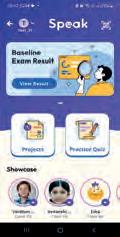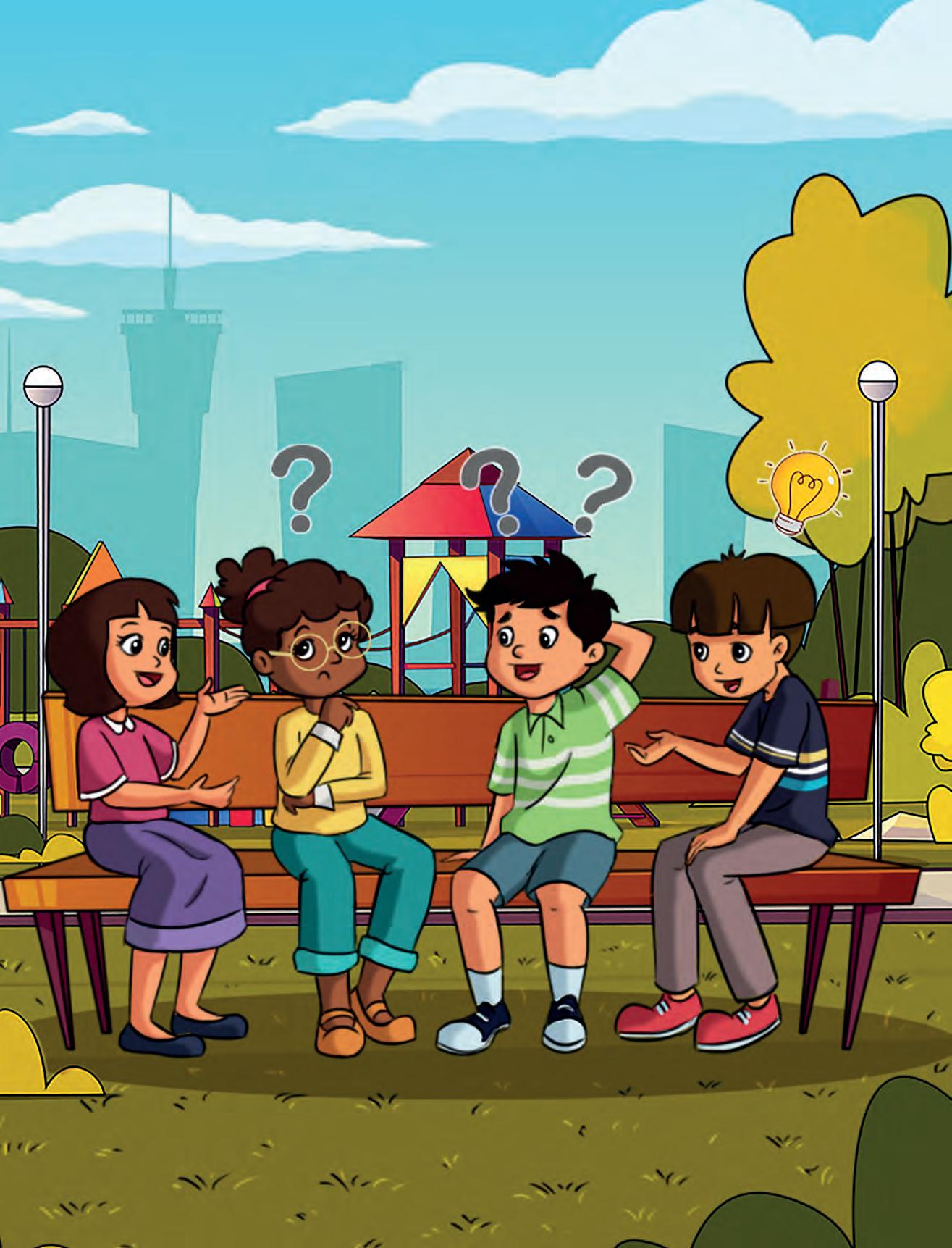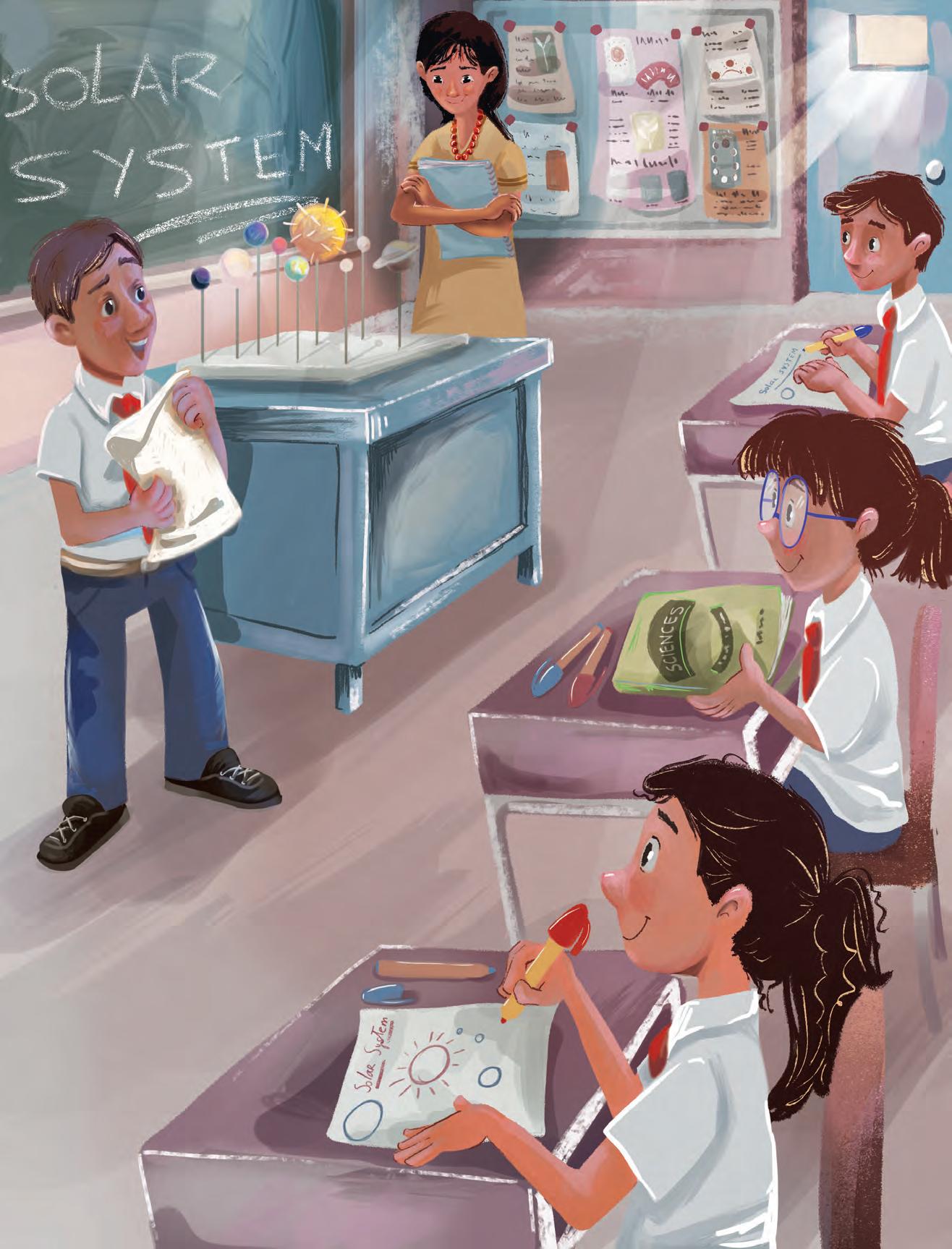

Achieve Fluency in Verbal Communication



Achieve Fluency in Verbal Communication
Achieve

Academic Authors: Chandani Goyal, Anuj Gupta, Kashika Parnami, Laraine O’Connell
Creative Directors: Bhavna Tripathi, Mangal Singh Rana, Satish
Book Production: Sanjay Kumar Goel
Project Lead: Sneha Sharma
VP, Learning: Abhishek Bhatnagar
All products and brand names used in this book are trademarks, registered trademarks or trade names of their respective owners.
© Uolo EdTech Private Limited
First impression 2023
Second impression 2024
Third impression 2025
This book is sold subject to the condition that it shall not by way of trade or otherwise, be lent, resold, hired out, or otherwise circulated without the publisher’s prior written consent in any form of binding or cover other than that in which it is published and without a similar condition including this condition being imposed on the subsequent purchaser and without limiting the rights under copyright reserved above, no part of this publication may be reproduced, stored in or introduced into a retrieval system, or transmitted in any form or by any means, electronic, mechanical, photocopying, recording or otherwise, without the prior written permission of both the copyright owner and the above-mentioned publisher of this book.
Book Title: Conversations 6
ISBN: 978-81-980824-2-8
Published by Uolo EdTech Private Limited
Corporate Office Address:
85, Sector 44, Gurugram, Haryana 122003
CIN: U74999DL2017PTC322986
Illustrations and images: www.shutterstock.com, www.stock.adobe.com and www.freepik.com
All suggested use of the internet should be under adult supervision.
In the age of globalisation and unprecedented technological advancement, English stands as a universally comprehensible medium of communication. It has evolved into one of the essential tools that learners require to thrive in today’s world and secure their future. Studies from across the globe have also shown that English communication skills significantly impact on career prospects and lifelong learning.
Functional and fluent communication skills in English, encompassing the crucial facets of LSRW (Listening, Speaking, Reading, and Writing), are pivotal for children’s knowledge acquisition; intellectual, social, and emotional development; and lifelong learning.
In particular, robust listening and speaking skills not only form the bedrock of the language learning process but also pave the way for enhanced reading and writing capabilities. Yet, the majority of educational efforts prioritise teaching reading and writing from the very outset, sometimes neglecting listening and speaking skills. These foundational skills are often overlooked in educational institutions due to high pupil-teacher ratios, lack of opportunities to express themselves in English, and, most significantly, a lack of structured and dedicated class time for honing these skills.
It is within this context that Uolo Speak has been introduced as a groundbreaking English program tailored for learners in pre-primary to grade 8, with a special emphasis on English listening and speaking. In alignment with the National Education Policy (NEP) of 2020 and the learning outcomes set forth by the National Council of Educational Research and Training (NCERT).
The Conversations book serves as the classroom-based avenue for developing functional speaking skills. The book contains teacher-led English speaking and listening activities that adhere to the highly recommended and research-based teaching-learning method known as the Gradual Release of Responsibility (GRR). This approach systematically guides learners in mastering the targeted competencies. Through these activities, learners engage in high-quality, age-appropriate, and experiential tasks that foster confidence and fluency in English. The accompanying Teacher Manual provides in-depth implementation plans for these activities.
The mobile interface of this educational product ensures consistent practice of functional English skills. These exercises transcend conventional question types, employing cutting-edge technology to facilitate learning and provide instant feedback. For instance, learners can practise English speaking on the App and receive AI generated feedback. This allows learners to grow skills over a period of time and gain confidence to express themselves in English in their daily lives.
Uolo Speak offers a potent, captivating, and unique learning experience for learners. It embodies a pragmatic, results-oriented approach to cultivating indispensable functional English skills required for the 21st century. We extend our warmest wishes to all educators, parents, and learners as they embark on this exciting journey with Uolo Speak, filled with fun and joyful experiences.

Dr Laraine O'Connell
D. Litt., English, North West University, South Africa
I am a veteran English teacher and lecturer, with a great love for English and for teaching. I have taught English and trained teachers over many years. I live in South Africa and it is a wonderful experience working with a company promoting the learning of English in India.
Welcome to the Speak journey!
The program is a thoughtfully crafted activities-based learning experience that build students’ speaking skills in English. The program, with dedicated time and space within the classroom, becomes a platform to practice speaking and listening skills in everyday scenarios. These scenarios are created by way of teacher-led activities, which cater to specific competencies in English.
Course Book
Speak on the Spot Activities
Prepared-speaking Activities
Teacher Manual
Student and Teacher Apps
Talking Books
Listening and Speaking Projects
Interactice Practice Quizzes

The classroom program is augmented by the digital world, which is presented to the students through the UOLO App. The app includes projects that are closely associated with the activities in the coursebook. The projects allow a fear-free practice time to children at home and are AI evaluated. The app also include quizzes in listening, speaking, reading and writing that can be consumed at home.

The National Education Policy (NEP) 2020, introduced by the Government of India, represents a transformative shift in the country’s education system. It aims to create a more holistic, dynamic and multidisciplinary approach to education. NEP 2020 focuses on fostering conceptual understanding, skills, values and competencies that align with the demands of the 21st century, while also preserving India’s rich cultural heritage. UOLO is fully committed to actualizing the vision of NEP 2020 by meticulously adhering to its outlined recommendations.



1. Comprehension and understanding
2. 21st century skills, values and dispositions
Competency Based Education
3. Application in real life




4. Holistic and integrated learning
5. Enjoyable and engaging
6. Collaborative and exploratory activities
NEP Pages 12, 17, 22
Teaching and Learning Pedagogy
7. Technology based solutions

NEP Pages 3, 11, 12, 27
8. Assessment of core concepts and application skills Assessments
NEP Pages 12, 18, 22
Exposure to rich literature, as stories and poems, that demonstrate essential speaking behaviours and competencies.
1 2 3 4 5
Vocabulary development—through the book and digital interface—to build mastery on new words, usage and expression.
1 2 7
Enhanced listening comprehension and elevated English learning experience through animations that bring each text to life.
1 5 7

Digital projects and supportive platforms that present English speaking opportunities in a fear-free environment.
2 3 4 5 7 8
Classroom activities and presentations that help build confident expression and language usages in everyday scenarios.
2 3 4 5 6 8
1 Comprehension and understanding
2 21st century skills, values and dispositions
3 Application in real life
4 Holistic and integrated learning
5 Enjoyable and engaging
6 Collaborative and exploratory activities
7 Technology based solutions
8 Assessment of core concepts and application skills

“In the 21st century, language teaching must go beyond traditional approaches and must aim to enable students to use language skills in real-life contexts for a wide variety of purposes.” (NEP, 2020)
According to Vygotsky and Krashen’s theory of second language teaching, language acquisition happens best when learners are engaged in purposeful and meaningful tasks in an anxiety-free, non-judgmental, communication-oriented, input-rich, supportive and stressfree environment, along with a lot of scaffolding practices. This approach to second-language teaching is also highlighted by the NIPUN Bharat Mission document and NEP, 2020.
In this context, the Conversations series, along with the learning activities designed in it, can play a crucial role in creating an input-rich environment, employing diverse avenues for speaking practice in a fear-free and non-judgemental setting, coupled with real-time feedback.
The book has been developed based on the ‘Gradual Release of Responsibility’ (GRR) model—a teaching-and-learning model that has been widely recommended by the NEP, 2020 and the NCF, 2023. The GRR has been promoted by educational researchers and practitioners all over the world for its effectiveness in promoting student engagement and deep understanding of content and skills.
The GRR model includes three steps, each one consecutively shifting the ‘responsibility’ from teachers to learners so that learners become independent users of the language.
I do: The teacher first provides explicit instructions and modelling that initiate the learning process.
We Do: As learners begin to grasp the content and skills, the teacher also begins to shift the responsibility to them, facilitating a guided practice where the teacher and the learners participate collaboratively.
You Do: Finally, the learners take full ownership of their learning through independent practice and the application of the skills learnt in the program.
Based on this approach, there are three core instructional models on which the activities work (please refer to lesson plans in the Teachers' Manual for greater clarity). These are:
Fully guided; Modelled speaking by the teacher
Collaborative: Shared speaking between the learners and the teacher
Independent practice and application by the learners
To sum it up, this has been created with a view to doing away with the fear of speaking in English among learners and allowing them to express themselves confidently in English in reallife situations.
The National Curriculum Framework for Foundational Stage (NCF) , released in 2023, is developed based on the vision of the National Education Policy (NEP) 2020, and to enable its implementation. The NCF provides guidelines for designing school syllabi and textbooks in India. It aims to improve the quality of education by making it more relevant, engaging, inclusive, and learner-centric. To achieve this, the NCF has articulated precise Learning Standards through well-defined Curricular Goals and Competency statements. These statements serve to harmonize the syllabus, content, pedagogical practices, and assessment culture, ensuring a cohesive and comprehensive educational experience. Curricular Goals: Curricular Goals are statements that give directions to curriculum development and implementation. They are derived from Aims and are specific to a Stage in education. Competencies: Competencies are learning achievements that are observable and can be assessed systematically. These Competencies are derived from the Curricular Goals and are expected to be attained by the end of a Stage.

































C-1.1 Identifies main points and summarizes from a careful listening and reading of the text (news articles, reports, and editorials)



























C-1.2 Listens critically and paraphrases ideas (distinguishes between facts and opinions stated in panel discussions and debates)
C-1.3 Listens to, plans, and conducts different kinds of interviews (structured and unstructured)
C-1.4 Raises probing questions about social experiences using appropriate language (openended/closed-ended, formal/informal, relevance to context, with sensitivity)
C-1.5 Writes different kinds of letters, essays, and reports in appropriate style and registers for different media for different audiences and purposes
C-1.6 Creates content for audio, visual, or both for different audiences and purposes
C-4.1 Comprehends the way words and sentences are used in different subjects across the curriculum
C-4.2 Describes concepts in different subjects across the curriculum through the effective use of language
CG-1
Students develop the capacity for effective communication using language skills for description, analysis, and response
CG-4
Students develop the ability to use language effectively in other curricular areas to comprehend concepts and share their understanding with others.
1 Know About Me Introducing oneself formally
2 Describing Events Describing an event or experience
3 Ask and Answer Asking questions and responding to them
4 Twisty Tales Telling a folktale with a twist
5 Group Discussions Participating in group discussions
6 Let Me Guide You Giving instructions
7 Empowering Speech Giving a short speech
8 Expressing Feelings Expressing personal feelings and emotions
9 Hear My Slogans Saying slogans
Answer questions related to oneself
Introduce oneself formally
Answer questions about an event/experience
Describe an event/experience with a few details
Ask questions starting with what, where, why, when and how.
Respond to questions.
Change some aspects of a famous folktale
Narrate the twisted folktale in a captivating manner
Listen closely to one another during a group discussion
Stay on the topic and extend the discussion in a respectful and coherent manner
Talk about the dos and don’ts for simple life events/activities
Give step-by-step instructions in order to guide someone or get something done
Share short, motivational and catchy taglines/titles
Give a short speech on a topic of personal relevance
Appreciate and respond to feelings of others on an issue
Share personal feelings, ideas and emotions on a topic or event
Make catchy slogans on common issues and topics Present slogans in a compelling manner 10 Explaining What and Why Stating cause and effect
Identify and state the cause(s) of an event
Explain the effect(s) of an event
Give a short and informative
11 Hear Me Present Making a short presentation
12 Can You Convince? Speaking persuasively
Presentation on a topic
Ask and answer questions based on the presentation
Identify the main idea and supporting arguments from an opinion
Speak persuasively in support or against of something

Talking Book: Animated video of the text Talking Book
Cover page: Tells the learners the name of the chapter and theme.

Chapter text: Main text to demonstrate targeted competency
Keywords: Keywords from the text with meaning and pronunciation
E-Speak 1: A series of three guided speaking projects on the mobile app


Speak on the Spot: Impromptu speaking activity to be done in the classroom

speaking (with no expectation of








Practise: Guidance on how to practise at home
Present: Instruction on how to present in the class


































Asking questions and responding to them





































You can use the following phrases while discussing as a group:
I agree with you … I think … I disagree with you … In my opinion …
I would like to add …
However, in my experience …
Well, that’s one way of looking at it but …
I would also like to suggest …
2
Practise: Practise your lines at home with your friends and family.
3
Present: Participate in the group discussion.


Engage in a polite discussion with your classmates. Look at each other when you discuss the topic. Treat everyone’s viewpoints with respect.

























Practise: Present your speech to the family. Refer to the tips below to make it more interesting. Practise many times.
Present: Give a short and engaging speech to talk about your dreams. 3


Speak clearly and with expressions. Make eye contact with your audience.
Use an enthusiastic tone of voice and body language to keep the audience engaged.
In the end, you may ask the audience if they feel inspired.
















































Making a short presentation



















People have become more aware and prefer using environment friendly products. You have to share whether you like to use cloth bags or paper bags. Tell us your preference in 4-5 lines. Give reasons to support your choice.
Read the sentences and tick () the opinion that you feel is the most appropriate.

Watching television can help us learn about new things.
Playing games on smartphones can make us an addict.


Watching shows on the computer is better than reading books.




Practise: Practise saying your lines in front of an elder, at home.
Present: Share your opinion with the class.


Be confident and loud while speaking. You can bring the type of bag that you have chosen to show in the class. Speak in complete sentences.



This Conversations book aims to systematically build English language skills in learners and enable them to verbally express themselves in real-world situations. Each chapter focuses on building specific English language competencies and weaves together activities that are research-based, age-appropriate, contextual, experiential and joyful. The activities adhere to the highly recommended and research-based teaching-learning method known as the Gradual Release of Responsibility (GRR), which has been endorsed by the NEP, 2020 and the NCF, 2023. Through the series, learners receive dedicated time and space within the classroom to express themselves in English which helps them in becoming confident speakers of the language.
• Activity-based Learning: The book offers joyful experiential activities that build English communication competencies.
• Texts per the NEP 2020 Themes: The book has exciting and stimulating texts that pave the way for English communication activities.
• Tech Integration: The book works in sync with our digital component, where various other activities and projects are undertaken. Learner outputs are evaluated through an AI-based speech recognition engine.
• Teachers’ Manual: The book is complemented by the Teachers’ Manual that enables teachers to conduct each session effectively.
Uolo partners with K-12 schools to provide technology-based learning programs. We believe pedagogy and technology must come together to deliver scalable learning experiences that generate measurable outcomes. Uolo is trusted by over 15,000+ schools across India, South East Asia and the Middle East.
ISBN 978-81-980824-2-8
